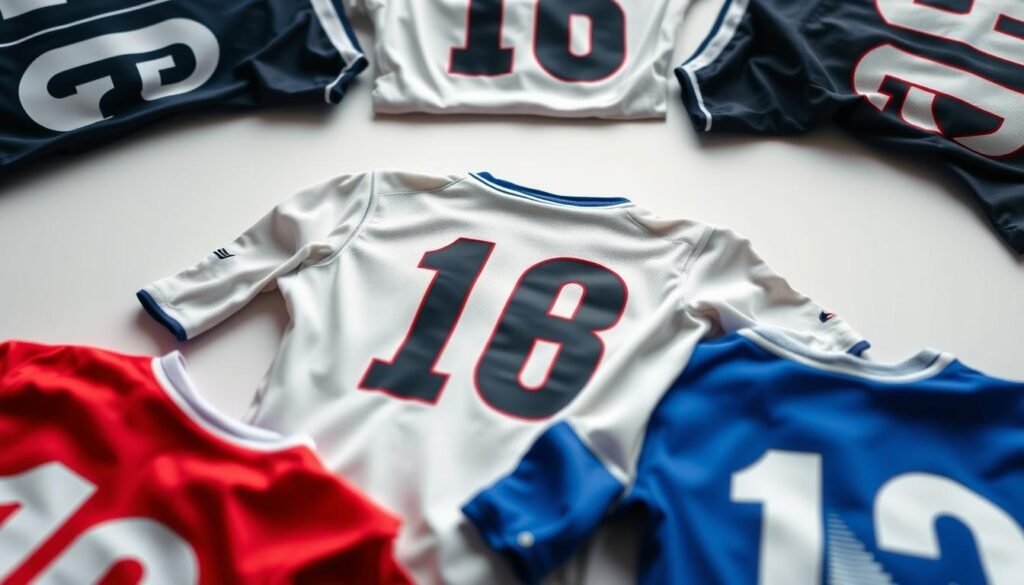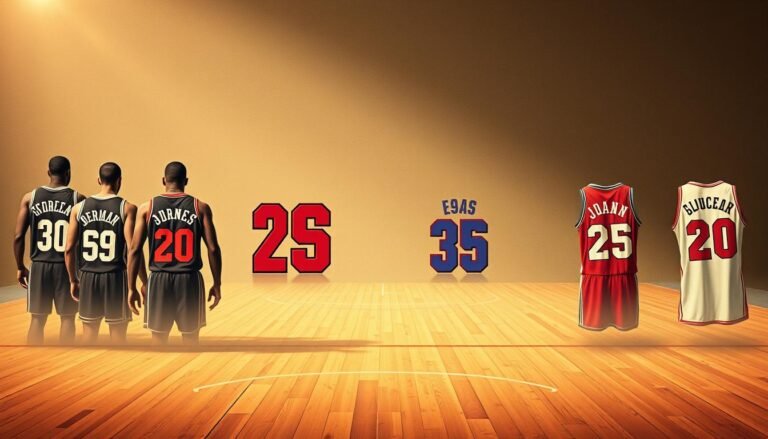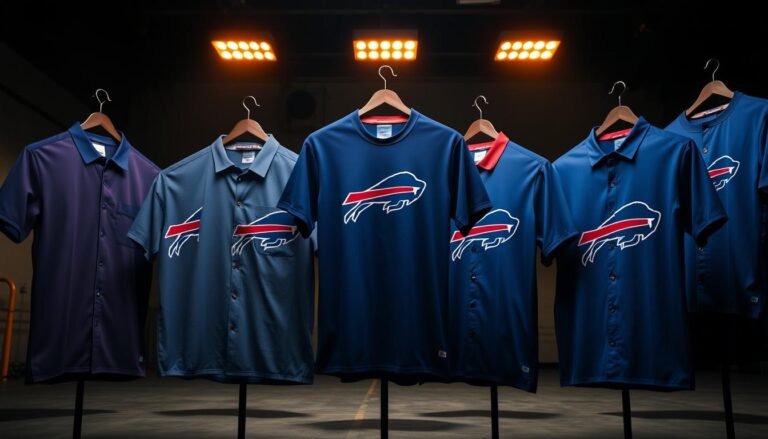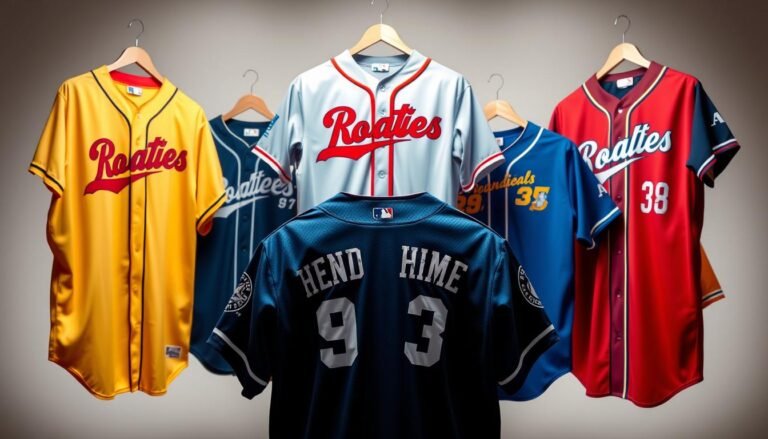Athlete branding has become a crucial aspect of sports marketing, with jersey numbers playing a significant role in shaping a player’s identity and marketability.
The choice of a jersey number can influence how fans perceive an athlete, impacting their brand and marketing potential. Certain numbers are associated with specific traits or historical significance, affecting how athletes are viewed by their audience.
Understanding the psychology behind jersey numbers can provide valuable insights into athlete branding and sports marketing strategies.
Key Takeaways
- Jersey numbers significantly impact athlete branding.
- Certain numbers are associated with specific traits or historical significance.
- The choice of jersey number can affect an athlete’s marketability.
- Understanding the psychology behind jersey numbers is crucial for effective sports marketing.
- Athlete branding is a key aspect of sports marketing.
The Historical Evolution of Jersey Numbers in Sports
Jersey numbers have a rich history that dates back to the early days of organized sports. Initially, numbers were used as a practical solution to identify players on the field.
Origin of Numbered Jerseys in Team Sports
The introduction of numbered jerseys in the early 20th century marked a significant shift in how teams approached player identity by number. This change was driven by the need for clearer identification of players during games, especially as sports became more competitive and widely followed.
| Year | Sport | Notable Event |
|---|---|---|
| 1910s | Baseball | First use of numbered jerseys in professional sports |
| 1920s | Football | Adoption of numbered jerseys in collegiate football |
| 1930s | Basketball | Introduction of numbered jerseys in professional basketball |
Transition from Functional Identifiers to Marketing Assets
As sports evolved, jersey numbers transitioned from being mere identifiers to becoming crucial elements of sports branding. The iconic numbers worn by legendary athletes became synonymous with their personal brand, enhancing their marketability and fan recognition.
The historical evolution of jersey numbers highlights their transformation from functional identifiers to powerful marketing tools, significantly impacting how athletes are perceived and marketed.
The Psychology Behind Number Selection
Jersey numbers are more than just identifiers; they carry personal, cultural, and psychological weight for athletes. The process of selecting a jersey number can be influenced by a variety of factors, including personal significance, superstitions, and cultural or religious symbolism.
Personal Significance and Athlete Superstitions
Many athletes choose their jersey numbers based on personal significance or superstition. For instance, a number might be chosen because it was worn by a favorite player during childhood or because it is considered lucky. Superstitions play a significant role in sports, with some athletes believing that certain numbers can bring them good fortune or enhance their performance.
Cultural and Religious Number Symbolism
Cultural and religious beliefs also influence jersey number selection. Certain numbers are considered sacred or auspicious in various cultures, while others might be viewed as unlucky. Athletes often choose numbers that align with their cultural or religious backgrounds, adding a layer of personal identity to their jersey.
Psychological Attachment to Specific Digits
| Number | Common Association | Psychological Impact |
|---|---|---|
| 7 | Luck, Perfection | Confidence Boost |
| 23 | Iconic (e.g., Michael Jordan) | Inspiration, Legacy |
| 13 | Unlucky | Avoidance |
Athletes may develop a psychological attachment to specific digits due to personal experiences, cultural influences, or the significance of those numbers in their sport. Understanding these attachments can provide insights into effective marketing strategies that resonate with athletes and fans alike.
How Jersey Numbers Affect Marketing: The Direct Connection
The connection between jersey numbers and marketing is more profound than one might initially think, influencing brand recognition and consumer behavior. Jersey numbers have become an integral part of sports branding, with the potential to significantly impact marketing effectiveness.
Number Recognition and Brand Association
Jersey numbers are instantly recognizable, and their association with a particular athlete or team can evoke strong brand loyalty. Numbers like 23, associated with Michael Jordan, or 7, linked to Cristiano Ronaldo, have become synonymous with excellence in their respective sports. This recognition can be leveraged in marketing campaigns to create an immediate emotional connection with fans.

The Commercial Value of Distinctive Numbers
Distinctive jersey numbers can command a premium in the market, driving merchandise sales and endorsement deals. The commercial value of these numbers lies in their ability to differentiate athletes and teams, making them more marketable. As a result, athletes and teams are willing to invest in securing and promoting unique numbers.
Consumer Psychology and Number Memorability
The memorability of jersey numbers is a critical factor in consumer psychology, influencing purchasing decisions and brand loyalty.
“Numbers that are easy to remember and have a positive association can become a powerful marketing tool, driving sales and fan engagement.”
Marketers can capitalize on this by incorporating memorable numbers into their branding strategies.
In conclusion, jersey numbers play a vital role in sports marketing, influencing brand recognition, commercial value, and consumer psychology. By understanding the direct connection between jersey numbers and marketing, brands can develop more effective strategies to engage with their audience.
Iconic Jersey Numbers That Defined Sports History
Certain jersey numbers have etched themselves into the annals of sports history, forever associated with the athletes who wore them. These numbers have transcended their functional purpose, becoming symbols of greatness and legacy in their respective sports.
Basketball’s Legendary Numbers
Basketball has its fair share of iconic jersey numbers. Numbers like 23, worn by Michael Jordan, have become synonymous with excellence and competitive drive. Other notable numbers include 24, associated with Kobe Bryant, and 33, famously worn by Kareem Abdul-Jabbar.
- 23: Michael Jordan’s number, symbolizing greatness and dominance on the court.
- 24: Kobe Bryant’s number, representing his fierce competitiveness and dedication.
- 33: Kareem Abdul-Jabbar’s number, signifying his record-breaking achievements.
Football’s Historic Digits
In football, certain jersey numbers have become legendary, symbolizing the prowess and skill of the athletes who wore them. Numbers like 10, 7, and 12 are etched in the memories of fans worldwide.
- 10: Often worn by playmakers and quarterbacks known for their exceptional skill and leadership.
- 7: Frequently associated with talented players known for their speed and agility.
- 12: A number often linked to quarterbacks and players who have made significant contributions to their teams.
Baseball and Hockey Number Traditions
Baseball and hockey also have rich traditions surrounding jersey numbers. In baseball, numbers like 42, retired across all MLB teams, symbolize the breaking of racial barriers. In hockey, numbers like 99, worn by Wayne Gretzky, have become iconic, representing unparalleled achievement and dominance on the ice.
The significance of these numbers extends beyond the athletes who wore them, as they have become part of the cultural fabric of their respective sports, influencing player identity by number and contributing to sports branding efforts.
Jersey Numbers as Personal Brands
Athletes’ jersey numbers are no longer just identifiers; they’ve become integral to their personal brands. This transformation is evident in how top athletes have leveraged their jersey numbers to build extensive marketing empires.
Case Study: Michael Jordan’s 23 Empire
Michael Jordan’s jersey number 23 is one of the most iconic numbers in sports history. Jordan’s success on the court, coupled with his marketability, turned the number 23 into a symbol of excellence. The “Jumpman” logo, which features Jordan’s silhouette, is often associated with the number 23, creating a powerful brand identity.
“The number 23 became synonymous with Michael Jordan’s greatness, and it was a key factor in his global brand recognition.”
Case Study: Cristiano Ronaldo’s CR7 Brand
Cristiano Ronaldo has successfully branded himself around his jersey number 7. The “CR7” label, a combination of his initials and jersey number, has been used across various business ventures, including clothing and footwear. This branding strategy has made Ronaldo a global sports icon.
| Athlete | Jersey Number | Brand Identity |
|---|---|---|
| Michael Jordan | 23 | Jumpman/23 |
| Cristiano Ronaldo | 7 | CR7 |
| Tom Brady | 12 | TB12 |
Case Study: Tom Brady’s TB12 Lifestyle Brand
Tom Brady has built a lifestyle brand around his jersey number 12, known as TB12. This brand encompasses not just athletic wear but also a broader wellness and fitness philosophy. Brady’s branding efforts have extended his influence beyond football, into the health and wellness industry.
The use of jersey numbers in personal branding demonstrates the significant marketing potential of these numbers. Athletes like Jordan, Ronaldo, and Brady have shown how a jersey number can be transformed into a powerful brand, driving merchandise sales, endorsement opportunities, and overall brand recognition.
The Financial Impact of Jersey Number Selection
Athletes’ jersey numbers play a pivotal role in determining their marketability and financial success. The choice of jersey number can significantly influence an athlete’s branding, affecting various revenue streams.
Merchandise Sales Patterns
The sales of jerseys, a major revenue source for teams and leagues, are often driven by popular players and their numbers. For instance, Michael Jordan’s #23 jersey remains one of the top-selling jerseys in the NBA.

Endorsement Opportunities Tied to Numbers
Certain jersey numbers become synonymous with a player’s identity, enhancing their appeal to sponsors. For example, Cristiano Ronaldo’s CR7 brand has leveraged his #7 jersey number across various endorsement deals.
Revenue Generation from Signature Numbers
Signature numbers can generate substantial revenue through licensing agreements and merchandise sales. The table below illustrates the potential revenue streams associated with iconic jersey numbers.
| Jersey Number | Athlete | Revenue Stream | Estimated Annual Revenue |
|---|---|---|---|
| 23 | Michael Jordan | Jersey Sales, Licensing | $50 million |
| 7 | Cristiano Ronaldo | Endorsements, Merchandise | $30 million |
| 12 | Tom Brady | Licensing, Lifestyle Brand | $20 million |
The financial impact of jersey number selection is multifaceted, influencing merchandise sales, endorsement opportunities, and overall revenue generation. Athletes and teams must strategically choose and manage jersey numbers to maximize their financial potential.
Strategic Number Changes and Rebranding
Jersey number changes are not just a matter of personal preference; they are often strategic moves with significant marketing implications. Athletes and their teams carefully consider these changes to refresh their brand image, align with new team dynamics, or capitalize on new marketing opportunities.
Marketing Motivations Behind Number Switches
Athletes may change their jersey numbers for various marketing reasons. For instance, a number change can signal a new chapter in an athlete’s career, potentially attracting new fans and sponsors. It can also be a strategic move to differentiate oneself from other players or to align with a new team or brand identity.
Case Studies of Successful Number Transitions
Several athletes have successfully transitioned to new jersey numbers, enhancing their brand. For example, when Lebron James switched from #23 to #6 with the Los Angeles Lakers, it was seen as a fresh start, aligning with his broader brand beyond basketball.
| Athlete | Original Number | New Number | Marketing Impact |
|---|---|---|---|
| Lebron James | 23 | 6 | Fresh start, broader brand appeal |
| Cristiano Ronaldo | 7 (Manchester United) | 7 (Juventus) | Consistency, brand recognition |
Consumer Response to Athlete Number Changes
Consumer response to jersey number changes can vary. Some fans embrace the change, seeing it as a positive evolution of the athlete’s brand. Others may resist, preferring the familiarity of the old number. Effective marketing campaigns can mitigate resistance by engaging fans with the reasoning behind the change.
Ultimately, strategic number changes can be a powerful tool in sports branding, offering athletes a chance to rebrand, refresh, and reconnect with their audience.
Team and League Marketing Through Jersey Numbers
Teams and leagues have long recognized the marketing potential of jersey numbers, leveraging them to create powerful brand identities. This approach has become increasingly sophisticated, incorporating various strategies to engage fans and drive sales.
Retired Numbers as Marketing Tools
Retiring a player’s number is a time-honored tradition in sports, serving as a lasting tribute to their contributions. This practice also creates a marketing opportunity, as retired numbers become instantly recognizable and emotionally resonant with fans. For example, the NBA’s Boston Celtics have retired the numbers of legendary players like Bill Russell and Larry Bird, using these iconic numbers in marketing campaigns to evoke nostalgia and loyalty.
Commemorative Campaigns and Anniversaries
Teams and leagues often launch commemorative campaigns around significant anniversaries or milestones, utilizing jersey numbers as a central element. These campaigns can include special edition merchandise, promotional events, and social media initiatives. For instance, the NFL’s Kansas City Chiefs celebrated the 50th anniversary of their Super Bowl IV victory with a commemorative jersey patch featuring the number IV.
Limited Edition Merchandise Strategies
Limited edition merchandise featuring popular jersey numbers is a lucrative marketing strategy, driving sales and creating a sense of urgency among fans. Teams and leagues release special edition jerseys, often in collaboration with popular players or to commemorate significant events. The NBA’s “City Edition” jerseys, for example, frequently feature unique numbers or design elements that become highly sought after by collectors.
| Team | Retired Number | Commemorative Campaign |
|---|---|---|
| Boston Celtics | 23 (Larry Bird) | 80s Throwback Jerseys |
| Los Angeles Lakers | 24 (Kobe Bryant) | Mamba Forever Jerseys |
| New York Yankees | 23 (Don Mattingly) | Throwback Series |
Digital Marketing and Jersey Numbers
Digital marketing has revolutionized the way jersey numbers are perceived and utilized in sports branding. The rise of digital platforms has opened new avenues for athletes, teams, and leagues to leverage their jersey numbers as marketing tools.
Hashtag Strategies and Social Media Presence
One of the key strategies in digital marketing involving jersey numbers is the creation of hashtags. For instance, campaigns like #23forMe (inspired by Michael Jordan’s iconic number) have been used to engage fans and promote brand identity. Social media platforms are flooded with content centered around jersey numbers, creating a viral buzz that enhances an athlete’s or team’s marketability.
Digital Content Creation Around Jersey Numbers
Digital content creation is another vital aspect. Athletes and sports organizations produce a variety of content, from highlight reels to behind-the-scenes stories, all centered around the jersey number. This content not only boosts the athlete’s brand but also drives fan engagement. For example, throwback jerseys featuring legendary numbers are a popular trend, fostering nostalgia and loyalty among fans.
Virtual Merchandise and Gaming Integration
The integration of virtual merchandise and gaming has further amplified the significance of jersey numbers. In virtual gaming environments, players can purchase and wear digital jerseys with their favorite numbers, expanding the reach and revenue potential of sports branding. This trend is particularly prevalent in sports like soccer and basketball, where virtual leagues and fantasy teams are incredibly popular.
In conclusion, digital marketing has transformed jersey numbers into powerful branding tools, leveraging social media, digital content, and virtual merchandise to engage fans and drive revenue.
Cross-Cultural Perspectives on Jersey Numbers
The significance of jersey numbers extends beyond the playing field, deeply rooted in cultural perceptions that vary across global markets. This diversity in number perception significantly impacts how athletes brand themselves and how teams market their merchandise internationally.
Lucky and Unlucky Numbers Across Global Markets
In many cultures, certain numbers are considered lucky or unlucky, influencing consumer preferences. For instance, the number 8 is auspicious in Chinese culture due to its phonetic similarity to the word ‘prosperity.’ Conversely, the number 4 is often avoided because it sounds like the word ‘death.’ Athletes and brands must be aware of these cultural nuances when selecting jersey numbers for international markets.
International Marketing Adaptations
To successfully market jerseys globally, brands must adapt to local number preferences. This might involve producing more jerseys with culturally auspicious numbers or avoiding those considered unlucky. For example, in Japan, the number 5 is considered lucky, which could influence the production of jerseys with this number for the local market.
Cultural Sensitivity in Number Marketing
Cultural sensitivity is crucial when marketing jersey numbers. Brands that understand and respect local customs are more likely to succeed. This involves not just the selection of numbers but also the marketing campaigns surrounding jersey sales. By being culturally aware, brands can avoid unintended offense and enhance their global appeal.
The Future of Jersey Number Branding
The future of jersey number branding is poised to revolutionize the sports marketing landscape. As technology continues to advance, new and innovative ways to market and brand jersey numbers are emerging.
Emerging Trends in Number-Based Marketing
One of the significant emerging trends is the use of NFTs (Non-Fungible Tokens) to create unique digital ownership experiences for fans. This allows fans to own a piece of sports history associated with their favorite players’ jersey numbers.
Technology Integration with Jersey Numbers
Technology is being integrated into jersey numbers through augmented reality (AR) experiences. AR can bring jersey numbers to life, offering fans interactive and immersive experiences that enhance their engagement with the sport.
NFTs and Digital Ownership of Iconic Numbers
NFTs are changing the way iconic jersey numbers are marketed and owned. By creating digital collectibles, teams and players can offer fans a new way to connect with their favorite sports moments.
Augmented Reality Experiences
Augmented reality is being used to create engaging experiences around jersey numbers, such as virtual displays of historic jerseys or interactive games that utilize a player’s jersey number.
Blockchain Authentication of Number Heritage
Blockchain technology is being utilized to authenticate the heritage of iconic jersey numbers, ensuring their legitimacy and providing a secure way to verify their history.
These emerging trends and technologies are set to transform the jersey number branding landscape, offering new opportunities for fan engagement and revenue generation.
Conclusion
The significance of jersey numbers in sports marketing and branding has been thoroughly explored throughout this article. From their historical evolution to their current role in athlete branding, jersey numbers have proven to be a crucial element in the sports industry.
Jersey numbers and marketing are closely intertwined, as a player’s number can become synonymous with their identity and brand. The psychology behind number selection, including personal significance and cultural symbolism, plays a substantial role in shaping an athlete’s brand.
Sports branding relies heavily on jersey numbers, with iconic numbers like Michael Jordan’s 23 and Cristiano Ronaldo’s CR7 becoming instantly recognizable. The commercial value of distinctive numbers is undeniable, driving merchandise sales and endorsement opportunities.
As the sports industry continues to evolve, the importance of jersey numbers in player identity by number will only continue to grow. Emerging trends in number-based marketing, technology integration, and digital ownership of iconic numbers will shape the future of jersey number branding.
In conclusion, jersey numbers are more than just a functional identifier; they are a vital component of an athlete’s brand and a key driver of sports marketing efforts.





